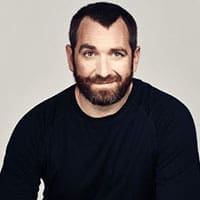New guidelines urged for family-centred care after a loved one’s cardiac arrest
Samina Ali awoke with a start at 5 a.m. to the sound of her husband, Tim Graham, gasping for breath beside her. He was only 46 years old, but she knew immediately that his heart was in trouble.
A physician and professor of pediatrics at the University of Alberta, Ali called 911, started chest compressions and sorted out care for their three children as Tim was rushed to the hospital in an ambulance.
It was a whirlwind of stress for the family that left Ali sleepless for months afterwards, even though Tim survived his cardiac arrest and was released from hospital just two weeks later.
“The cardiologist shook our hands and said, ‘This is a miracle, it’s such an incredible outcome. You should be so happy, have a great rest of your lives,’” Ali remembers. “We went home, and every time I had doubt, sadness or anger about what happened, it felt like a betrayal because our amazing care team told us we were so gosh darn lucky.
“I know now that all the things that I felt were very normal feelings, but once you leave the hospital, there’s no follow-up. You have to process all of it on your own.”

Matthew Douma
 Tim Graham and Samina Ali |
| Recommended |
| Remnant cholesterol significant risk factor for cardiovascular disease
|
| Researchers pinpoint genetic defects that cause heart failure
|
| How reducing sodium intake can help heart failure patients
|
Ali had to seek out private counselling, including guided family debriefing, to deal with post-traumatic stress symptoms.
Ali hopes other families won’t have to do the same on their own. She served as a survivor family adviser for a U of A-led study on the care needs of families of cardiac arrest patients, which proposes new clinical practice guidelines. The paper has won the 2023 Article of the Year from the Emergency Nurses Association and the Journal of Emergency Nursing.
“It used to be that the guidance (for emergency medical services and hospital staff) was mostly about how to break bad news to families,” says lead author Matthew Douma, an emergency nurse educator and adjunct professor of critical care medicine. “We want to reconceptualize that.”
“Our research reflects that the families need to be heard, their presence respected and acknowledged early on. They need the right information provided in the right way at the right time.”
Sixty thousand Canadians experience cardiac arrest outside of hospitals each year. Only one in 10 survive, according to the Heart and Stroke Foundation of Canada. For Ali, her husband’s cardiac arrest was a rude awakening, both professionally and personally.
“It’s a very different experience being a family member when you’re used to being the one providing the healthcare,” she says. “After Tim got home, I’d be up all night waiting for something bad to happen again. I just couldn’t trust that we were safe. And there’s a genetic component to his cardiac issue, so then I was worrying about the kids.”
Ali is convinced the medical staff her family encountered were well-meaning, but some just didn’t have the training to meet their emotional needs.
“We don’t often realize how important that moment is when we ask the family to leave the patient care room, or we rapidly summarize what happened so we can just get them out of the intensive care unit because we need that bed for someone else,” Douma explains. “Those may not seem like very significant moments for healthcare providers, but sometimes they can be the most significant for families. Our work is really trying to shed light on those moments.”
Family-centred care has been a focus in pediatrics and critical care medicine for years, but little has been added for cardiac patient families. Douma, a PhD candidate at University College Dublin and an editor of the Canadian Journal of Emergency Nursing, has focused his doctoral studies on changing that through his Family Centred Cardiac Arrest Care project.
Douma himself lost his grandfather to a sudden cardiac arrest at home. His research team includes survivors, bereaved family members and co-survivors like Ali. Tim Graham, a clinical professor in the Department of Emergency Medicine, is also a co-author of the paper. Co-designing and carrying out research with people who have lived experience is important, says Douma.
“We really should stop designing healthcare without the people who are directly impacted by it,” he says. “We know that the health status of cardiac arrest survivors is so intertwined with that of their co-survivors and their family.”
The researchers analyzed 39 studies from the past 20 years, looking at the experiences of 418 people whose parents, spouses, siblings or close friends went through cardiac arrest. Like Ali, most family members called 911, initiated or witnessed CPR, and followed their loved ones to the hospital for treatment and admission.
“The family experience of cardiac arrest care is often chaotic, distressing and complex, and the after-effects are long-lasting. Patient and family experiences could be improved for many people,” the researchers concluded. “High certainty family care needs identified in this review include rapid recognition and response, improved information sharing, more effective communication, supported presence and participation, or supported absence, and psychological aftercare.”
Douma notes that the trauma from cardiac arrests is unique in that most happen outside of hospital and are fatal. If patients do survive, troubling questions remain about brain injury and quality of life after resuscitation.
“Survival is everyone’s priority, but then you’re navigating the nebulous unknown,” Douma says. “Families need to know, ‘Why did this happen? What condition will my loved one be in? How do I become a caregiver and a health system navigator? Who takes care of us after discharge?’”
Douma stresses that everyone can save a life by learning CPR and basic first aid, noting that courses are available through the Canadian Red Cross.
| By Gillian Rutherford
This article was submitted by the University of Alberta, a Troy Media Editorial Content Provider Partner.
The opinions expressed by our columnists and contributors are theirs alone and do not inherently or expressly reflect the views of our publication.
Troy Media
Troy Media is an editorial content provider to media outlets and its own hosted community news outlets across Canada.
